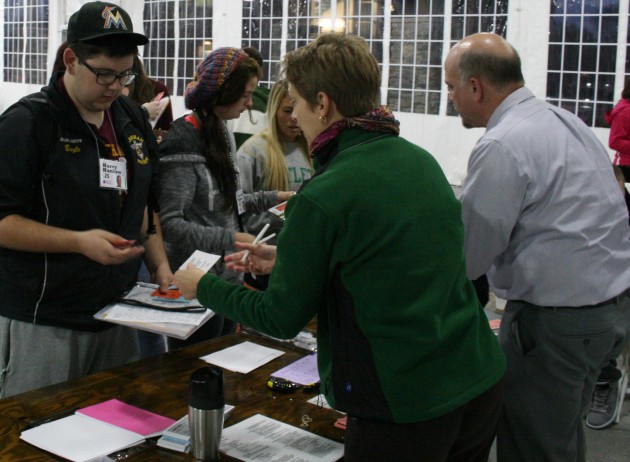Students learn by ‘living’ the other side

Here’s the scenario: Your family is stricken with poverty, working minimal jobs and trying to pay rent while sending the kids to school and paying for child care. Not only do all of these expenses pile up, but you have your health to worry about and the well-being of everyone else around you.
On Oct. 16, everything was put into perspective for students and faculty who attended the Poverty Simulation in the pavilion. Everyone entered, not knowing what to expect. Participants were split into different “families” and given different roles to portray throughout the hour.
Participants were told they would be living four 15-minute weeks. They would have to live and take care of themselves based on the income they earn and the circumstances that were thrown at them. The whistle blew, and the week started.
The whole pavilion exploded with confusion and anxiety. Families got together and tried to plan out their weekly spending and tackle their responsibilities. Parents went to work and children went to school. But as the weeks went on, new issues put families in danger of losing their houses or not being able to drive their cars to get to work to obtain the money they need.
Frustration hung in the air as the weeks went on. Some families had to pawn personal possessions and turn off their phone to pay for food for the week and to keep a roof over their heads.
As the weeks came to an end, some had resorted to breaking the law to pay their bills. Stealing and selling drugs became somewhat of the norm around the poverty-ridden town, which sent some family members to jail. Other families just gave up and were left sitting in their houses or living on the streets because of eviction.
Even with the help of the government and food stamps and child care, families were failing. It illustrated that even with welfare and assistance, it’s just not enough to survive on.
The simulation ends and a discussion breaks out about how everyone had been affected differently. And the word perspective was used a lot in conversation with the members of the different families. People said that they had never had to think about money in such a big way and it seemed at the end, giving up was the best option.
But for the actual families in poverty in the United States, giving up is not an option. They have the lives of young children resting on their shoulders at all times. And even at their worst points, these families have to stick together, usually meaning that parents have to take on second or third jobs to make sure that their families are cared for. Participants said they were filled with stress, anxiety and confusion by the simulation.
As most of the participants began to settle from the hour and the simulation started to close down, a very calming feeling hovered over everyone. It seemed as though everyone was lost in their own thoughts, thinking about their futures and how they could avoid this style of living. They seemed to be left with the realization that poverty can happen to anyone, especially with the way the economy fluctuates each year.
This Soundings event was more than just getting credit for a class. It helped people think and feel the weight of the world on their shoulders for just one hour. Which seemed to be long enough for some.






